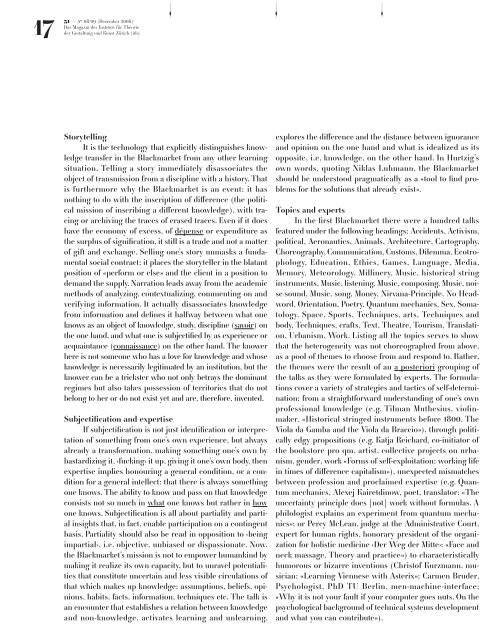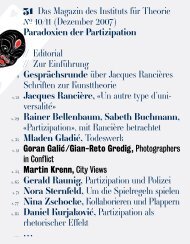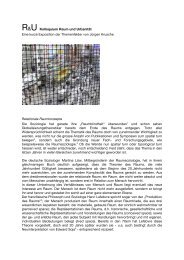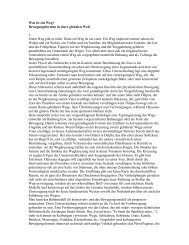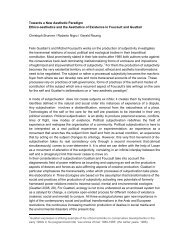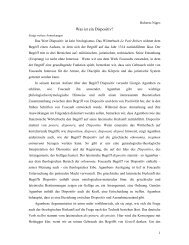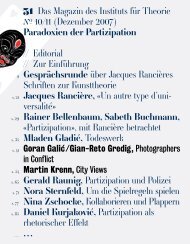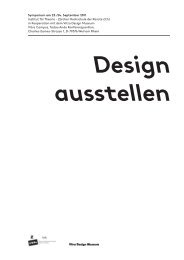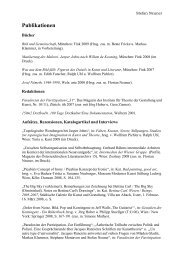PDF des gesamten Heftes (5MB) - Institut für Theorie ith
PDF des gesamten Heftes (5MB) - Institut für Theorie ith
PDF des gesamten Heftes (5MB) - Institut für Theorie ith
Erfolgreiche ePaper selbst erstellen
Machen Sie aus Ihren PDF Publikationen ein blätterbares Flipbook mit unserer einzigartigen Google optimierten e-Paper Software.
17<br />
31 — # 08/09 (Dezember 2006)<br />
Das Magazin <strong>des</strong> <strong>Institut</strong>s <strong>für</strong> <strong>Theorie</strong><br />
der Gestaltung und Kunst Zürich (<strong>ith</strong>)<br />
_–<br />
_–<br />
_–<br />
Storytelling<br />
It is the technology that explicitly distinguishes knowledge<br />
transfer in the Blackmarket from any other learning<br />
situation. Telling a story immediately disassociates the<br />
object of transmission from a discipline w<strong>ith</strong> a history. That<br />
is furthermore why the Blackmarket is an event: it has<br />
nothing to do w<strong>ith</strong> the inscription of difference (the political<br />
mission of inscribing a different knowledge), w<strong>ith</strong> tracing<br />
or archiving the traces of erased traces. Even if it does<br />
have the economy of excess, of dépense or expenditure as<br />
the surplus of signification, it still is a trade and not a matter<br />
of gift and exchange. Selling one’s story unmasks a fundamental<br />
social contract: it places the storyteller in the blatant<br />
position of «perform or else» and the client in a position to<br />
demand the supply. Narration leads away from the academic<br />
methods of analyzing, contextualizing, commenting on and<br />
verifying information. It actually disassociates knowledge<br />
from information and defines it halfway between what one<br />
knows as an object of knowledge, study, discipline (savoir) on<br />
the one hand, and what one is subjectified by as experience or<br />
acquaintance (connaissance) on the other hand. The knower<br />
here is not someone who has a love for knowledge and whose<br />
knowledge is necessarily legitimated by an institution, but the<br />
knower can be a trickster who not only betrays the dominant<br />
regimes but also takes possession of territories that do not<br />
belong to her or do not exist yet and are, therefore, invented.<br />
Subjectification and expertise<br />
If subjectification is not just identification or interpretation<br />
of something from one’s own experience, but always<br />
already a transformation, making something one’s own by<br />
bastardizing it, ‹fucking› it up, giving it one’s own body, then<br />
expertise implies honouring a general condition, or a condition<br />
for a general intellect: that there is always something<br />
one knows. The ability to know and pass on that knowledge<br />
consists not so much in what one knows but rather in how<br />
one knows. Subjectification is all about partiality and partial<br />
insights that, in fact, enable participation on a contingent<br />
basis. Partiality should also be read in opposition to ‹being<br />
impartial›, i.e. objective, unbiased or dispassionate. Now,<br />
the Blackmarket’s mission is not to empower humankind by<br />
making it realize its own capacity, but to unravel potentialities<br />
that constitute uncertain and less visible circulations of<br />
that which makes up knowledge: assumptions, beliefs, opinions,<br />
habits, facts, information, techniques etc. The talk is<br />
an encounter that establishes a relation between knowledge<br />
and non-knowledge, activates learning and unlearning,<br />
explores the difference and the distance between ignorance<br />
and opinion on the one hand and what is idealized as its<br />
opposite, i.e. knowledge, on the other hand. In Hurtzig’s<br />
own words, quoting Niklas Luhmann, the Blackmarket<br />
should be understood pragmatically as a «tool to find problems<br />
for the solutions that already exist».<br />
Topics and experts<br />
In the first Blackmarket there were a hundred talks<br />
featured under the following headings: Accidents, Activism,<br />
political, Aeronautics, Animals, Architecture, Cartography,<br />
Choreography, Communication, Customs, Dilemma, Ecotrophology,<br />
Education, Ethics, Games, Language, Media,<br />
Memory, Meteorology, Millinery, Music, historical string<br />
instruments, Music, listening, Music, composing, Music, noise/sound,<br />
Music, song, Money, Nirvana-Principle, No Headword,<br />
Orientation, Poetry, Quantum mechanics, Sex, Somatology,<br />
Space, Sports, Techniques, arts, Techniques and<br />
body, Techniques, crafts, Text, Theatre, Tourism, Translation,<br />
Urbanism, Work. Listing all the topics serves to show<br />
that the heterogeneity was not choreographed from above,<br />
as a pool of themes to choose from and respond to. Rather,<br />
the themes were the result of an a posteriori grouping of<br />
the talks as they were formulated by experts. The formulations<br />
cover a variety of strategies and tactics of self-determination:<br />
from a straightforward understanding of one’s own<br />
professional knowledge (e.g. Tilman Muthesius, violinmaker,<br />
«Historical stringed instruments before 1800. The<br />
Viola da Gamba and the Viola da Braccio»), through politically<br />
edgy propositions (e.g. Katja Reichard, co-initiator of<br />
the bookstore pro qm, artist, collective projects on urbanism,<br />
gender, work «Forms of self-exploitation: working life<br />
in times of difference capitalism»), unexpected mismatches<br />
between profession and proclaimed expertise (e.g. Quantum<br />
mechanics, Alexej Kairetdinow, poet, translator: «The<br />
uncertainty principle does [not] work w<strong>ith</strong>out formulas. A<br />
philologist explains an experiment from quantum mechanics»;<br />
or Percy McLean, judge at the Administrative Court,<br />
expert for human rights, honorary president of the organization<br />
for holistic medicine ‹Der Weg der Mitte›: «Face and<br />
neck massage. Theory and practice») to characteristically<br />
humorous or bizarre inventions (Christof Kurzmann, musician:<br />
«Learning Viennese w<strong>ith</strong> Asterix»; Carmen Bruder,<br />
Psychologist, PhD TU Berlin, men-machine-interface:<br />
«Why it is not your fault if your computer goes nuts. On the<br />
psychological background of technical systems development<br />
and what you can contribute»).


